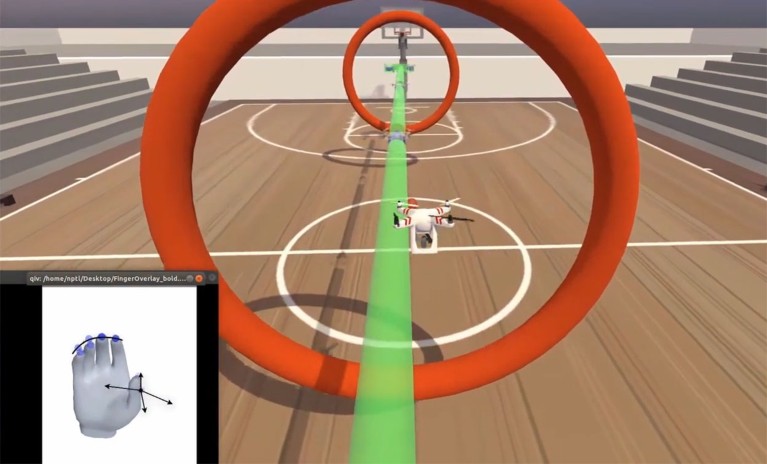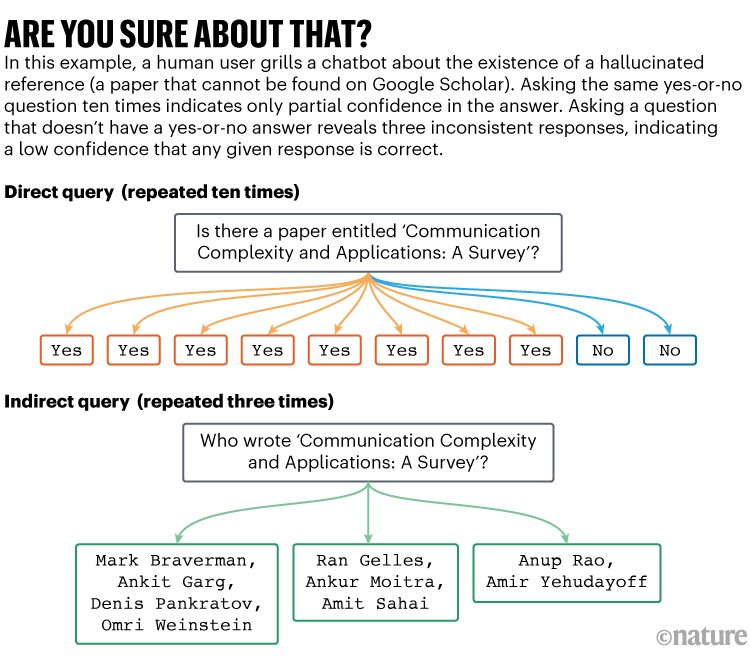Hello Nature readers, would you like to get this Briefing in your inbox free every day? Sign up here.

A view from the obstacle course game, in which a virtual drone is piloted using brain signals linked to finger movements. Credit: Willsey et al./Nature Medicine
Researchers have developed a device that let a 69-year-old man with paralysis fly a virtual drone using only his thoughts. The brain–computer interface (BCI) decoded the man’s brain activity as he imagined moving three groups of digits in real time. By associating neural signals with the movements of multiple fingers, the work builds on previous BCI research, most of which has focused on moving a single computer cursor or whole virtual hand.
Nature | 4 min read
Blockbuster weight-loss drugs such as Ozempic could raise a person’s likelihood of developing arthritis and a potentially deadly condition called pancreatitis. Researchers compared the health of more than 200,000 people with diabetes on Ozempic-like drugs, with about 1.7 million people using other blood-sugar-lowering medications over 3.5 years. They found that the drugs were associated with an 11% increase in arthritis risk and a 146% higher risk of pancreatitis, although they did lower the risk of dozens of physical and mental health conditions.
Nature | 5 min read
Reference: Nature Medicine paper
A faulty DNA-repair mechanism in neurons explains why people who inherit the deadly brain disease Huntington’s often show no symptoms until well into adulthood. The errors ramp up over the years until they hit a critical threshold and the neurons start to die, according to a study of the neurons hit hardest by the disease. Developing therapies that target these DNA-repair proteins could help to delay the onset of symptoms, say researchers.
Nature | 3 min read
References: Cell paper & Nature Medicine paper
Features & opinion
Ask an artificial intelligence (AI) chatbot for a scientific reference and it might give you the citation you’re looking for. Or, it could ‘hallucinate’, spitting out an only partially correct, or totally false, answer. Researchers say that preventing AI from erring altogether is impossible, but they’re working on measures that could make hallucinations less frequent and less problematic. These include making a chatbot refer to a trusted text before responding and conducting “brain scans” of a large language model’s artificial neurons to reveal patterns of deception. For now, the best defence might simply be to take the output of a chatbot with a large pinch of salt.
Nature | 12 min read

Source: Ref. 10
Since Russia’s invasion of Ukraine almost three years ago, nearly 20,000 Ukrainian children have been taken to Russia, and some might lose all evidence of where they came from. “Now is the time to develop a DNA kinship resource to aid Ukrainian families and communities seeking missing children,” writes Sara Huston, who co-founded DNA Bridge, a non-profit organization to advance the secure and ethical use of DNA testing to assist family reunifications in humanitarian settings. “As a geneticist and ethicist, I am familiar with the risks that come with DNA testing,” she says. But this “might be the only way to reconnect them with their families”.
Nature | 7 min read
A growing recognition of the unique perspectives that young people can bring to research has boosted the number of studies that involve them as participants and contributors. That’s a good thing, say four experts in the area, but it raises ethical and practical issues about how best to compensate children. Some form of payment can “be crucial to enabling some young people to participate, especially those from low-resource settings”, they write. But there’s a thicket of issues about what’s appropriate in different socio-economic and cultural contexts, and how compensation might risk creating expectations and dependencies.
Nature | 6 min read
Fans of Leif Penguinson, brace yourselves: penguins are getting divorced, and it’s no fun for their communities. A study of little penguins (Eudyptula minor) published in Ecology and Evolution suggests that the wee seabirds sometimes leave their life partners to seek new mates, and that the turmoil negatively affects the colony’s reproductive success.
Help us this newsletter happily ensconced in your inbox by sending us your feedback — whether positive or critical — to [email protected].
Thanks for reading,
Flora Graham, senior editor, Nature Briefing
With contributions by Jacob Smith
Want more? Sign up to our other free Nature Briefing newsletters:
• Nature Briefing: Careers — insights, advice and award-winning journalism to help you optimize your working life
• Nature Briefing: Microbiology — the most abundant living entities on our planet — microorganisms — and the role they play in health, the environment and food systems
• Nature Briefing: Anthropocene — climate change, biodiversity, sustainability and geoengineering
• Nature Briefing: AI & Robotics — 100% written by humans, of course
• Nature Briefing: Cancer — a weekly newsletter written with cancer researchers in mind
• Nature Briefing: Translational Research — covers biotechnology, drug discovery and pharma






